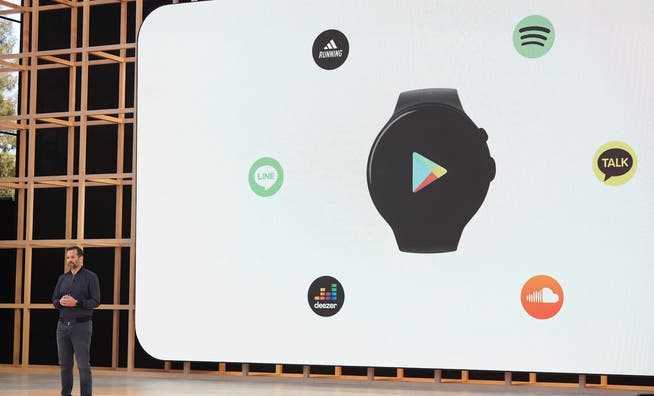Tablet computers, new headphones and, for the first time, a smartwatch: At its developer conference, Google is presenting new hardware that puts the group in clear competition with Apple.
For the third year in a row, Google’s developer conference will be largely virtual, broadcast from the Shoreline Theater in Google’s hometown of Mountain View.
CEO Sundar Pichai drew the most impressive trump card at the very end. The annual developer conference, the Google iO, drew to a close on Wednesday after two hours. “Augmented Reality” is the next growth area that Google is researching intensively. “The magic of technology really comes alive when you can use it in real life,” Pichai said as he stood onstage at Mountain View’s Shoreline Theater and addressed audiences both locally and in front of screens around the world – and suddenly presented new, artificially intelligent glasses.
Shortly afterwards, a video clip showed how this is supposed to work: Conversations are to be translated and transcribed in real time so that people can talk across language barriers. In the video, they were a deaf woman and an English-speaking daughter, who was able to better communicate with her Mandarin-speaking mother. “They’re like subtitles for real life,” Pichai said.
Google shows the potential of its new “Augmented Reality” glasses.
When the new Google AR Glasses will come onto the market, what they cost, in which languages they are available – the group left the viewers in the dark about all of this. When asked, Google said it was one of several prototypes it was working on, but it was still too early for specific announcements.
This is typical of Google’s developer conference: the company presents its latest innovations, shows what it is currently working on and provides insights into its bag of tricks – even if some of it is still immature. Apple will do something similar at its developer conference in early June; and the iPhone manufacturer has also been working on smart glasses for a long time, which is eagerly awaited.
New smartphones, headphones and, for the first time, a smartwatch
Google presented a whole range of new hardware on Wednesday, albeit some without a specific release date. Apparently they want to make sure that consumers have the announcements in mind if they buy new devices in the near future. Because in several product categories, Google is now in direct competition with the Apple group.

Google is launching its own smartwatch for the first time.
- Googlewatch: Google is launching its own watch for the first time. This should be combinable with Fitbit; Google acquired the fitness tracker manufacturer in 2019. Exactly how Fitbit technology will be integrated into Google’s own watch hasn’t been spelled out. The newly announced mobile wallet Google Wallet should also work on the new smartwatch. The smartwatch is scheduled to hit the market in the fall.
- Pixel Buds Pro headphones: Five years after the appearance of Google’s first wireless headphones, the group is now launching a version with active “noise cancellation” on the market. The battery life of these in-ear headphones is said to be up to seven hours.
- Pixel 7 and Pixel 7 Pro smartphones: The latest generation of smartphones should also be available in autumn. The group announced little more than that they will have the latest generation of the Tensor chip.
- Smartphone Pixel 6a: The A-series are lower-priced, stripped-down versions of Google’s smartphones. The latest model will be available to order in the US from mid-July and will cost $449; unlike its predecessor, it should also be available in Europe. It has the most important innovations from Google, such as a dual, smart camera lens, the powerful Tensor chip and a function for live translation.
- Android tablets: Likewise, Google is now planning its own tablet computer, which will probably compete directly with the iPad. The tablet is also scheduled to hit the market in the fall and will run on Google’s proprietary Tensor chip.
Advances in artificial intelligence
There were also some innovations in terms of software. With its DeepMind pillar, Google is one of the leading companies that research in the field of artificial intelligence and show what is possible today thanks to machine learning and speech recognition.
- Automatic summaries: In the future, an algorithm will provide users of Google Docs, Google Meet, videos and other products with a summary of the most important content. More videos on YouTube are also to be automatically divided into chapters so that users can find the content that is relevant to them more quickly.
- Multisearch: Search is Google’s core business and the group has expanded its competencies here in recent years to include Google Lens (smart camera lens) and speech recognition. In the future, these options will be combined.
- Privacy and Security: Google’s competitor Apple is known to be trying to present itself as a defender of privacy. Google has also recognized that consumers increasingly value privacy and security. The group promises that voice requests will be processed on the devices. There are also numerous innovations in the Android 13 smartphone operating system: SMS spam messages will be automatically blocked in the future and apps in the Play Store will be examined more critically for security gaps.
- AI test kitchen: In the past, Google has been accused time and again that its advances in the field of artificial intelligence raise moral questions – for example that face recognition does not work well with non-whites or that its intelligent speech system Duplex sounds deceptively real like a human being. Google is now opening up to feedback earlier in the development process: in the future, everyone should be able to test Google’s AI functions at an early stage and share any concerns via the AI Test Kitchen; such as the conversation program Lamda, where users can talk and exchange ideas with AI.
- Google’s assistant: In future, you no longer have to initiate a conversation with the virtual assistant with “Hey Google” to activate voice recognition. Instead, the Google Assistant recognizes when someone looks at and speaks to it, and also responds to multiple keywords instead of just one. “Talk naturally to the assistant,” said manager Sissie Hsiao. Even filler words like “äääh” or incomplete information are no longer a problem for communication with the assistant.
The NZZ correspondent Marie-Astrid Langer follow on twitter.
